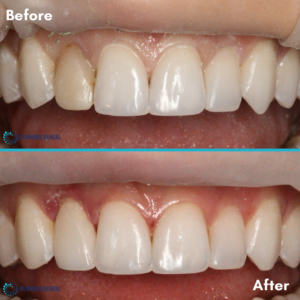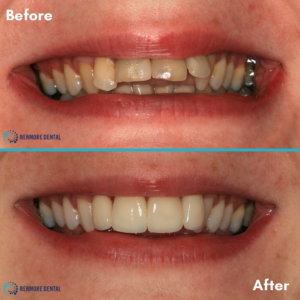Dental crowns can be a highly effective solution for broken, discoloured or damaged teeth.
If you have been recommended or are considering a dental crown, this post aims to answer some of the most commonly asked questions about this versatile treatment and what the process involves.
What exactly is a dental crown?
A dental crown is a restorative treatment in which a tooth-shaped “cap” is placed on top of a natural tooth in order to protect it. Dental crowns are custom made for each patient in a dental laboratory, colour matched and designed to blend seamlessly with the existing dentition.
Like a cover for your tooth, dental crowns fit over the entire tooth and are permanently cemented onto the existing tooth structure, making them a long-lasting and durable option for tooth restoration.
What are dental crowns used for?
A dental crown may be used in order to;
- Provide support and protection when a tooth has been fractured or damaged.
- Strengthen a tooth that has been weakened due to trauma or decay.
- Restore a tooth that has been worn down or broken, preventing further damage.
- Mask the shade and improve the aesthetics of a discoloured tooth.
- Protect a tooth that has undergone root canal treatment, ensuring the tooth structure is shielded from future damage or fracture.
- Restore a dental implant after placement, using an implant crown.

What are dental crowns made of?
Dental crowns can be made from many different materials, such as porcelain, ceramic, metal or resin.
Your dentist will always advise which type of crown will suit your specific needs; most dental crowns we provide at our practice are all-ceramic crowns, used for their durability and natural, enamel-like appearance.
I have been recommended to get a dental crown; why do I need it?
Your dentist may have recommended a dental crown for a tooth that has been weakened due to advanced decay or trauma, or to protect a tooth from further damage if it has broken or fractured.
Sometimes a tooth can be repaired with white composite filling material, however if the tooth is significantly damaged or there is too little tooth structure remaining to place a filling, then your dentist may recommend a dental crown to restore the tooth instead, as a more effective treatment option.
Do I need to get a dental crown following root canal treatment?
While a crown is not always required after root canal treatment, in some cases a dental crown will be necessary in order to protect the root-treated tooth. Whether or not a crown is needed depends on the location and position of the tooth, as well as how much of the tooth structure remains following the procedure. A dental crown may also be recommended to improve the colour and appearance of a root-treated tooth, which tend to discolour over time following treatment.
Your dentist will always advise what type of restoration would suit best following root canal treatment; if a crown is recommended, it is very important to carry out this treatment within the timeframe suggested by your dentist, as leaving the now-weakened tooth unrestored may lead to future tooth fracture and damage.
What is involved in the process of dental crown treatment?
Once your dentist has discussed crown treatment with you in detail and worked to create a treatment plan to best suit your smile, your dental crown treatment will be carried out over two separate visits.
During the first appointment (usually 60-90 minutes), the dentist will prepare the tooth for the crown; this involves shaping the remaining tooth structure and removing some of the enamel, creating a strong foundation and new tooth shape, onto which the dental crown will fit perfectly. The dentist will then take digital impressions of the tooth, scanning its shape and structure so that the dental laboratory can fabricate a custom dental crown that is created to the exact specifications required. The dentist will then fit a temporary crown, which will protect the prepared tooth until the permanent crown is fitted.
As we use premium, high quality dental laboratories to create our dental crowns, there is a waiting period of between two to four weeks for the custom crown to be made. You will then return for a second appointment (usually 30-45 minutes) during which the new crown is permanently cemented onto the prepared tooth structure.
The dentist will check the fit and aesthetics of the new dental crown to ensure it is the perfect shape and shade, and once the patient is completely happy with the look and feel of the crown, the treatment is complete, and your dentist will advise on how best to care for the crown to ensure a long-lasting restoration.
How long does a dental crown last?
The longevity of dental crowns can vary depending on many factors, such as the position and type of tooth, a patient’s eating habits and lifestyle, and their oral hygiene routine. With proper care and maintenance, including regular dental examinations and cleanings, a dental crown can last up to 15 years, providing a long-lasting and highly durable option for tooth restoration.
However, just like our natural teeth, crowns are also subject to wear and tear; and habits such as teeth grinding, clenching and nail biting, as well as eating hard or chewy foods may affect a crown’s longevity. Like always, maintaining an excellent oral hygiene routine is essential to ensure your crown lasts and functions as best it can.
Is a root canal always required prior to dental crown treatment?
While in some cases a tooth will need root canal treatment prior to a dental crown, it is not always necessary.
Your dentist will assess the need for endodontic treatment during consultation and advise what treatment plan would suit you best.
Are there any alternatives to a dental crown?
Dental crowns are often recommended where other restorations (such as fillings) will not suffice. If a tooth is very damaged, it may need to be extracted instead and replaced with a bridge, implant or denture; however, your dentist will always advise which is treatment option is best for your smile.

How much does a dental crown cost?
The cost of dental crowns can vary depending on the tooth type and complexity of the work involved, but as a general guide dental crowns cost between €850.00 and €1,200.00 per tooth. Dental crowns are also eligible for 20% tax relief under the Med2 scheme, which can be claimed from Revenue following completion of treatment.
How do I organise an appointment for a dental crown?
It is essential that you have a full consultation prior to any dental crown treatment, so that the dentist can create a comprehensive treatment plan that works best for you and your smile.
To organise a consultation with one of our clinicians to discuss dental crowns, contact our patient care team on 091 757 678 or email info@renmoredental.ie for more information. A list of all treatments we offer at the practice can be found in our treatment section.
